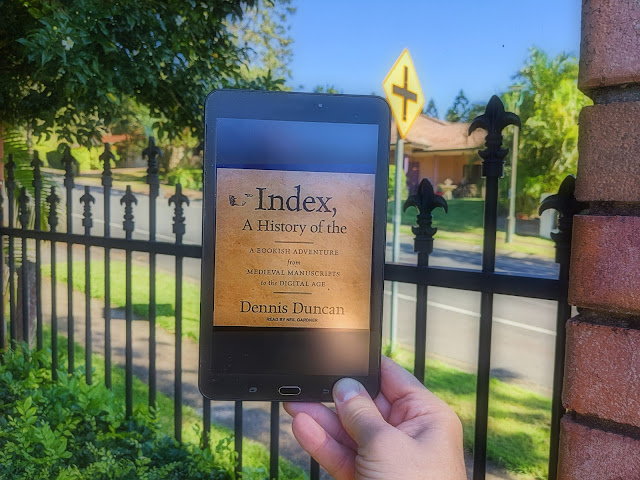
Index, A History of the: A Bookish Adventure from Medieval Manuscripts to the Digital Age by Dennis Duncan. Narration by Neil Gardner.
The title of this book by Dennis Duncan, with its words ordered as they might appear in an index entry, is a hint of the clever and witty writing contained inside. Who knew that the index - that set of pages at the back of (mostly nonfiction) books - had such a long and interesting history? It seems that Dennis Duncan knew.
Duncan, a professor of English at University College London, has an interest in the history of books. His previous book, co-edited with Adam Smyth, was called Book Parts, with chapters focused on all the pieces of a book that aren’t the main text.
Index, A History of the takes a deep dive into just one part of a book, exploring the history of indexes (or indices if you prefer the more latinesque form). Duncan tackles the topic with evident fondness and more than a little humor. We ARE talking about indexes, however, so at times the story does get a bit dry. But Gardner does a great job of keeping the reading light and between the narrator and the author even the driest parts don't seem that bad.
The index as we think of it today first sprang forth in the 13th century as an aid to monks and priests in locating specific passages in the Bible. As copies of the bible at that time were only available in manuscript form, each one unique from the next, so indexes themselves could only be specific to one manuscript.
An index entry, after all, has two key pieces to it - the thing you are searching for, and the place in the text where you can find it. But every manuscript of the Bible was unique, with no standard for text size or page numbers, and no agreement as to how many chapters a specific book in the Bible had, or where the breaks between chapters were.
As time went on the index idea spread to books that weren’t the Bible, making page numbering (so indexes would have places for their entries to refer to) an important consideration in the construction of a book.
Duncan also explores how the index came to be used in fiction as well, at least for a time, as well as how authors of fiction began to pen stories and novels that used the index as the form in which to tell their stories.
Later, Duncan brings us into the present day, and explores the relevance of indexes in an age where book contents in digital form can be easily searched. Indexes, the author argues, are not simply providing pointers to individual words in a book. Rather, they are the product of “deep reading” and rely on human knowledge and ability to draw out the important ideas in a written work, and to organize the book’s index in a way that points out the connections in the work to those ideas. In that way then, every index is a record of an individual deep reading of a book.
I listened to the audiobook edition narrated by British narrator Neil Gardner. Gardner did an excellent job. The only distraction was his occasional attempt to render a quote from an American in an American accent. This added an unintentional bit of humor.
It might seem a bit odd to read a book about a “book part” in an audio format. I know I missed a few things from the written edition. First, this book’s own index is said to be “magnificent” (according to the reviewer in the Washington Post), but it is not included in the audio (and likely wouldn’t be appreciated there). And second, there are 40 illustrations in the written book that I didn’t have access to. But I did get a well done reading by Gardner.
This is a microhistory, so by definition it’s a niche book. But, it’s done with enough humor and fondness that I think it might appeal even if you are only marginally interested in the idea at first. Overall it’s a book of interest both to academics and to mere book readers who might want to explore the history and importance of indexes.
RATING: Three Stars ⭐⭐⭐
Steve's Book Stuff participates in affiliate programs for the booksellers asterisked below. Purchases you make through an affiliate link will return a small commission to me, at no additional cost to you. Thanks for your support, it helps me buy books to read and review!
Borrow or Purchase Index, A History of the here:
📙 Borrow this book: Find out if your library has the ebook or audiobook available through OverDrive or Libby.
📘 Buy this book: Amazon | Barnes & Noble | Books-A-Million | AbeBooks* | Powell’s | ThriftBooks
📗 Support Indie Bookstores: Buy this book directly from Bookshop.org* or find an Independent Bookstore near you*.
📚 Visit my Bookshop.org shop to see all my reviewed books.
Title: Index, A History of the
Author: Dennis Duncan
Paper Version:
Publisher: W. W. Norton and Company
Publish Date: February 15, 2022
ISBN-13: 9781324002543
Publisher’s List Price: $30.00 Hardcover (as of 06/2022)
Audiobook version:
Publisher: Tantor Audio
Publish Date: February 15, 2022
Running Time: 8 hours, 9 min
Publisher’s List Price: N/A - available through Audible, Audiobooks.com, Scribd, etc.
